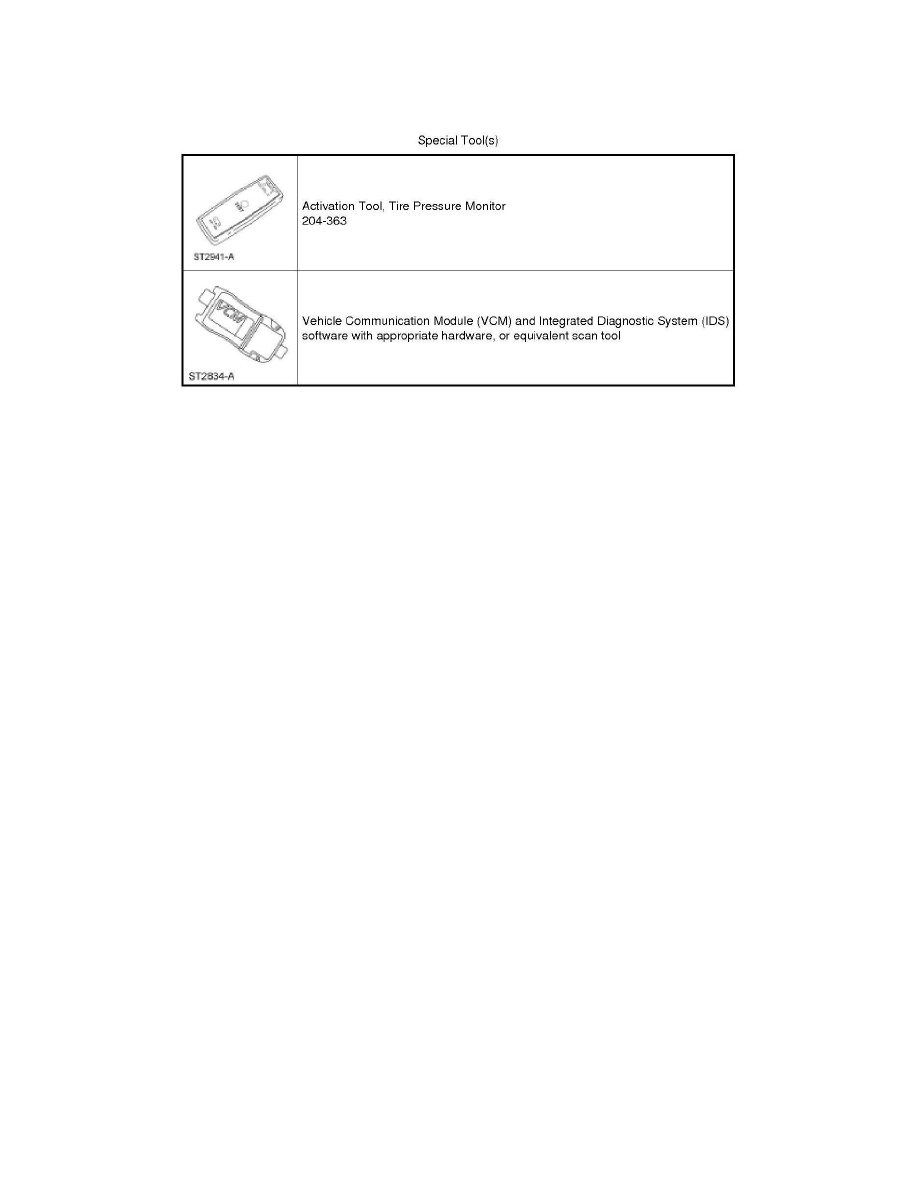Escape 2WD L4-2.5L Hybrid (2010)

Tire Pressure Sensor: Testing and Inspection
Tire Pressure Monitoring System (TPMS) Sensor Training
Tire Pressure Monitoring System (TPMS) Sensor Training
NOTE: If the vehicle has been stationary for more than 30 minutes, the sensors will go into a "sleep mode" to conserve battery power. It will be
necessary to wake them up so they will transmit the latest tire pressure information to the Smart Junction Box (SJB). For additional information, refer to
Tire Pressure Monitoring System (TPMS) Sensor Activation See: Testing and Inspection/Programming and Relearning.
NOTE: The Tire Pressure Monitoring System (TPMS) Training procedure must be done on a single vehicle, in an area without radio frequency noise
and at least 1 m (3 ft) away from other vehicles equipped with a Tire Pressure Monitoring System (TPMS). Radio frequency noise is generated by
electrical motors and appliance operation, cellular telephones, remote transmitters, power inverters and portable entertainment equipment.
NOTE: If a sensor does not respond to the Tire Pressure Monitor Activation Tool, move the vehicle to rotate the wheels at least one-fourth of a turn and
attempt to activate the same sensor again. If the sensor still does not respond, attempt to activate the same sensor again using the customer activation tool
(if available). If the sensor still fails to train, attempt to train the sensor with the vehicle doors open.
NOTE: The SJB has a 2-minute time limit between sensor responses. If the SJB does not recognize any 1 of the 4 tire pressure sensors during this time
limit, the horn will sound twice and the message center (if equipped) will display TIRE NOT TRAINED REPEAT and the entire procedure must be
repeated.
NOTE: For vehicles with different front and rear tire pressures (such as the E-Series and certain F-Series), the tire pressure sensors must be trained
following a tire rotation. Failure to train the sensors will cause the TPMS indicator to illuminate. For vehicles with the same tire pressure for front and
rear tires, tire rotation will not affect the system.
1. Turn the ignition switch to the OFF position, then press and release the brake pedal.
2. Cycle the ignition switch from the OFF position to the RUN position 3 times, ending in the RUN position.
3. Press and release the brake pedal.
4. Turn the ignition switch to the OFF position.
5. Turn the ignition switch from the OFF position to the RUN position 3 times, ending in the RUN position.
-
The horn will sound once and the TPMS indicator will flash if the training mode has been entered successfully. If equipped, the message center
will display TRAIN LF TIRE.
6. NOTE: It may take up to 6 seconds to activate a tire pressure sensor. During this time, the Tire Pressure Monitor Activation Tool must remain in
place at the valve stem.
Place the Tire Pressure Monitor Activation Tool on the LF tire sidewall at the valve stem. Press and release the test button on the Tire Pressure
Monitor Activation Tool. The horn will sound briefly to indicate that the tire pressure sensor has been recognized by the SJB.
7. Within 2 minutes of the horn sounding, place the Tire Pressure Monitor Activation Tool on the RF tire sidewall at the valve stem and press and
release the test button to train the RF tire pressure sensor.
